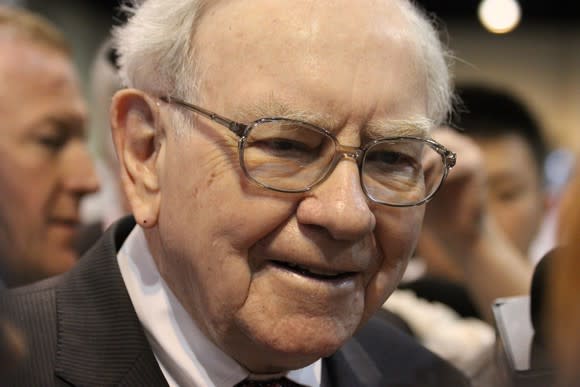Is Warren Buffett Losing His Patience With Wells Fargo?
Wells Fargo (NYSE: WFC) has been a staple of Berkshire Hathaway's (NYSE: BRK-A) (NYSE: BRK-B) closely watched stock portfolio for years. It's actually the largest stock position in the portfolio in terms of market value as of this writing.
After the news of the now-infamous "fake accounts" scandal broke a little over a year ago, Warren Buffett spoke favorably of the bank's long-term prospects, and it appeared that Berkshire's Wells Fargo stake would remain just under the key 10% regulatory threshold. Well, fast-forward a year, and Berkshire's third-quarter SEC filings show that the Wells Fargo stake has decreased in size by nearly 3.8 million shares.
This raises the question -- is Warren Buffett starting to lose faith in Wells Fargo?

Image source: The Motley Fool.
An incredible institution?
As Buffett often does after such major news about one of his stock holdings, he remained quiet in the weeks following the news of the scandal. When he finally broke his silence about two months later, many investors were surprised to learn that Buffett hadn't sold a single share in reaction to the news.
Buffett told CNN in an interview that the bank's incentive system for its employees was a "terrible mistake," as the bank's sales goals led to a culture of corruption and bad behavior, and that management should have stepped in and made changes long before they did.
However, Buffett went on to say that the bank is an "incredible institution" with a fantastic record of smart risk management, efficient operations, and profitability that consistently ranked among the highest in the banking industry.
There's never just one cockroach in the kitchen
Buffett has used the line "There's never just one cockroach in the kitchen" many times throughout his investing career to describe what typically happens when a major scandal or other problem with a company is revealed. In other words, when you start looking closer, it's hardly ever just the one thing that's wrong.
That has certainly been the case with Wells Fargo. For starters, just a few months ago, a third-party review of the bank's sales practices found that 3.5 million accounts may have been improperly opened, which was 67% higher than the original estimate.
The bank has also been accused of wrongdoing in several other smaller-scale scandals recently.
In May, Wells Fargo was accused of making unauthorized changes to many home loans.
In June, it was revealed that Wells Fargo wrongly charged 800,000 of their auto loan customers for auto insurance they didn't need.
In August, the bank was accused of failing to refund money due to some of its auto borrowers.
In September, the bank was accused of improperly raising customers' mortgage rates.
The effects of the scandals are certainly apparent
It isn't much of a surprise that the scandals would have somewhat of a negative effect on Wells Fargo's business, at least in the short term. The bank's third-quarter earnings showed that this is indeed the case.
For starters, Wells Fargo's revenue fell by 2% year over year, while all of the other big U.S. banks' revenue grew.
More alarming is that Wells Fargo's profitability and efficiency have taken a hit. The bank's return on assets (ROA) and return on equity (ROE) have dropped to 0.94% and 9.06% over the past year, below the industry benchmarks of 1% and 10%, respectively. This is the first time in years that Wells was not the best out of the "big four" U.S. banks in both categories. Plus, the bank's efficiency ratio has eroded from 59.4% to 65.5% since the third quarter of last year, another troubling sign.
Let's take a step back
As a final thought, it's important to point out that the reduction of Berkshire's Wells Fargo stake is actually pretty small. It's certainly more than Buffett would need to sell to keep his position from growing, which has been the reason for some previous Wells Fargo sales. In fact, Berkshire said in April 2017 that the company planned to sell about 9 million shares of the bank during the second quarter in order to manage the size of the position. Well, Berkshire ended up selling 11.7 million during the second quarter, in addition to the 3.8 million Berkshire sold during the third quarter.
To be perfectly clear, it's entirely possible that the sales are in anticipation of Wells Fargo buying back more shares, which would make Berkshire's stake represent a higher percentage of the company. And since Wells Fargo was given the green light for an increased $11.5 billion buyback plan in June 2017, this could certainly be the reason for some, if not all, of the sales. However, if Berkshire's recent reduction of its Wells Fargo stake was simply for regulatory compliance, it seems odd that the company wouldn't announce this, as it did for the earlier sales.
Another possible reason is that Wells Fargo added a massive investment in Bank of America to its portfolio as a result of the company exercising warrants, so it's possible that Berkshire simply wanted to reduce its financial sector exposure a bit.
Whatever the reason, the recent sale represents less than 1% of Berkshire's Wells Fargo stake, so there's no reason to get too excited just yet. However, Berkshire's Wells Fargo stake is certainly worth monitoring to see if the Oracle of Omaha may be running short of patience with the bank, especially with the rest of the financial sector firing on all cylinders.
More From The Motley Fool
6 Years Later, 6 Charts That Show How Far Apple, Inc. Has Come Since Steve Jobs' Passing
Why You're Smart to Buy Shopify Inc. (US) -- Despite Citron's Report
Matthew Frankel owns shares of Berkshire Hathaway (B shares). The Motley Fool owns shares of and recommends Berkshire Hathaway (B shares). The Motley Fool has a disclosure policy.

